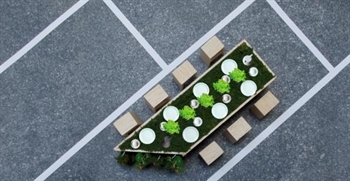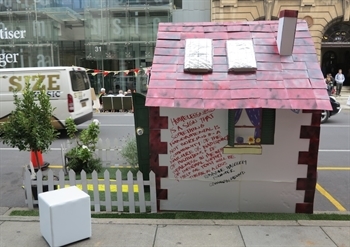
Turning our perceptions of parking space upside down with International Park(ing) Day
 By Marisa Novara and MPC Research Assistant Jason Brown
By Marisa Novara and MPC Research Assistant Jason Brown - October 9, 2013
For the past few years, Metropolitan Planning Council (MPC) has been covering the evolving phenomenon of Park(ing) Day, the third Friday in September that is now celebrated globally as a day to take back the streets by temporarily claiming parking spaces as people places. Park(ing) Day is not only a fun opportunity to play with urban space in a different way, but also a challenge for cities to think about their design on a human scale, to move away from car-oriented planning policies and to highlight local cultural and commercial assets.
It’s great to see that MPC is not alone in championing these values. In the past few years, Park(ing) Day has provided the platform to prove that these ideas are global phenomena. As you can imagine, there are many ways to approach public space development, but there are some specific examples from around the world that encourage us to activate by advocating, collaborating and even competing to create better places for our region’s residents. In this series, MPC will examine how these three different methods played out across the world.
Compete: Adelaide and Poznan

The winning design for Poznan's Park(ing) Day places a picnic in the park(ing) lot.
Malta Festival Poznan
Some cities, like Adelaide, Australia and Poznan, Poland, have decided to encourage better public space design through competition. Poznan celebrated its first Park(ing) Day this year by announcing a contest in May that drew 14 designs from all over Poland. The winner, Katarzyna Zareba, installed a design on Plac Kolegiacki in Poznan, which is "an interesting space, albeit not very people-friendly: deprived of benches and packed with parked vehicles,” according to organizing group Malta Festival Poznan, the group that organized the contest. The winning design consisted of a picnic table and seating space that invited people to come and pass the time.

One group's creative installation highlighting homelessness in Adelaide.
Rip It Up (Australia)
Adelaide, like Philadelphia, has taken a more immediately collaborative approach and spiced it up with a judging panel and people’s choice award. Adelaide organizers partnered with the Adelaide City Council and outlined a specific route along which participants were strongly encouraged to install for visual effect and accessibility. The organization process also utilized a registration period to get a better idea of how many groups would participate and where they would land. What’s nice about this model is that many participants were welcome, and were also encouraged to step up their game to get the popular vote—these are places for the people, after all.
Whether it is promoting the best design or catalyzing creativity among contending good designs, a little friendly competition may help everyone work to make better, truly innovative public places.